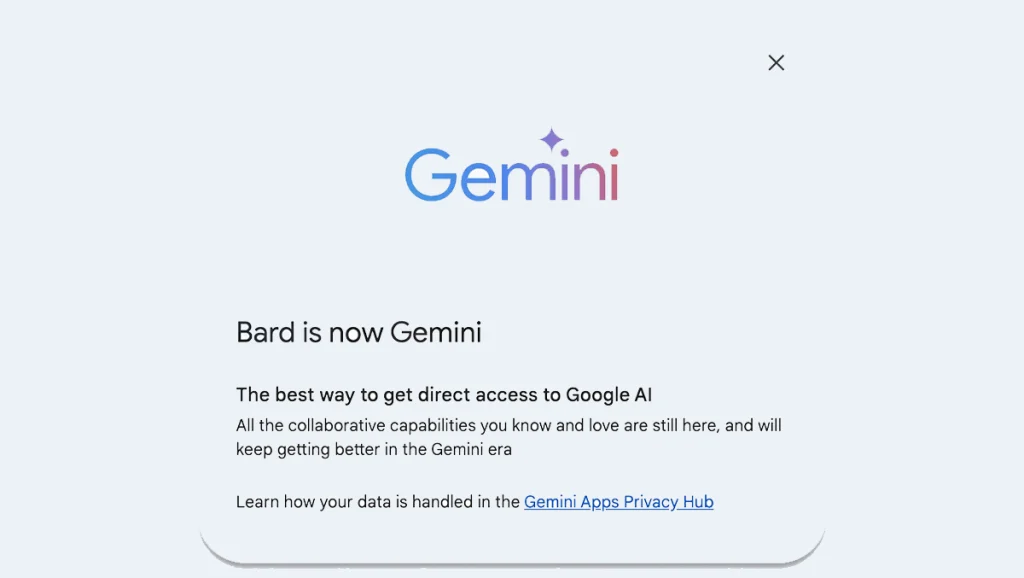Google Will Change the Name of Its AI Chatbot Bard: New Branding Strategy Unveiled
Google recently announced a change, for its AI chatbot formerly known as Bard. Integrating the latest advancements in artificial intelligence, Google’s Bard has been enhanced with a new AI model which is expected to substantially upgrade the chatbot’s reasoning abilities. This move by the tech giant demonstrates its dedication to staying in AI technology aiming to enhance user experience and keep up in the world of AI chatbots.
Google’s chatbot is now going by the name Gemini with the introduction of its new-generation AI model. The decision to change the name reflects Google’s vision, for an digital assistant, as well as the evolution of the AI itself. This development within Google’s AI ventures is particularly noteworthy given the surge of interest in AI chatbots.
The rebranded Gemini aims to offer users accurate and insightful interactions leveraging a vast pool of web knowledge. As the field of AI continues expanding Google’s update to its chatbot is seen as a move to maintain its prominence, in artificial intelligence.

The Evolution of AI in Search and Communication
The field of artificial intelligence is rapidly progressing, in the areas of search and communication. Tech giants, like Google and Microsoft are leading the way in this evolution redefining how users interact with technology. These advancements have implications for data management, ethics and competition.
Google’s Bard: A New Era in Chat Bots
Google’s chatbot, known as Bard represents a milestone in AI. It leverages the resources on the internet to provide users with high quality responses and serve as a platform for exploring new ideas and information. Bard showcases Google’s advancements in utilizing AI for search data and social media.
Impact on Data and Performance
The integration of AI technologies like Bard into search engines brings about changes to the landscape specifically in terms of data handling and performance. Search engines are no longer query responders; they now act as information providers that offer personalized content. This leads to improved accuracy in search data. Revolutionizes the user experience:
- Personalization: AI customizes search results based on preferences.
- Efficiency: Users can expect responses that’re more relevant to their needs resulting in increased satisfaction.
Ethical Considerations in AI
With the rise of AI driven solutions, in search and communication comes a range of considerations that warrant attention.
Ensuring the protection of privacy, accuracy, in information and avoiding biasess extremely important. Companies like Google and OpenAI have a responsibility to address concerns and maintain user trust by implementing:
- transparent data usage policies.
- Robust frameworks to identify and address any biases that may arise from AI systems.
Competitive Landscape: Microsoft and OpenAI
When it comes to competition in the AI field Microsoft has also made progress by incorporating AI into their Bing search engine through collaboration with OpenAI and their AI model called ChatGPT. The competition between these companies is fierce as they constantly innovate to enhance the application and performance of AI technology. As users begin to experience the improved capabilities of AI powered search tools market shares are being shaken up.
Business and Education Implications
These advancements have implications for both business practices and educational systems. For businesses Google’s decision to rename its AI chatbot as Bard signifies a repositioning that will bring about changes in marketing strategies and financial services. On the hand educational systems will witness an emphasis on personalized learning with an increased integration of AI technologies.
Influence on Marketing and Financial Services
In terms of marketing Bard’s advanced capabilities provide businesses with methods, for understanding their target audiences and devising targeted campaigns. By analyzing amounts of consumer data companies can gain insights that enable them to create more effective campaigns.
In finance and banking, AI assists in risk assessment, investment strategies, and capital management, enhancing accuracy in financial forecasting and personalized customer service.
- Improved consumer engagement through data-driven personalization.
- Enhanced precision in financial modeling and investment decision-making.
AI’s Role in Education and Personalized Learning
The use of AI, in education is becoming increasingly common as it allows for learning. This means that teaching methods and materials are adjusted to suit the needs of students. Educators are using AI platforms like Bard to identify areas where students need help and provide them with customized resources. This has the potential to revolutionize the way teaching and learning take place.
- Educators: Leverage AI for adaptive curriculum development.
- Students: Benefit from customized learning paths that align with their pace and style.
AI tools not make administrative tasks more efficient for educators. Also create new opportunities for students to engage with information in ways that were previously unimaginable. This sets a foundation, for learning and skills development.







